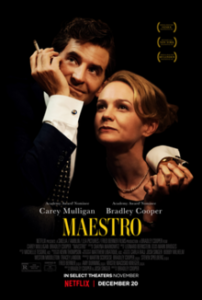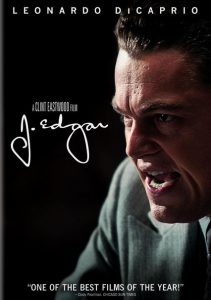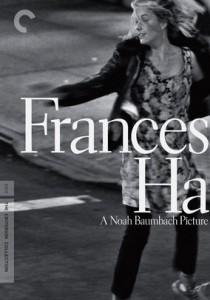Maestro-2023
Director Bradley Cooper
Starring Bradley Cooper, Carey Mulligan
Scott’s Review #1,411
Reviewed December 3, 2023
Grade: A
Brilliance personified defines Maestro (2023), a film directed by and starring Bradley Cooper. As if that isn’t enough Cooper co-wrote the screenplay with Josh Singer and co-produced the project with Martin Scorcese and Steven Spielberg.
With riches such as these players involved equates to adequate muscle to make the film a necessary watch brimming with creativity and good storytelling.
There is no disappointment whatsoever in the buildup. Maestro expresses powerful acting, creative direction, and a musical score encompassing the works of the man being examined, Bernstein.
At the conclusion, I found myself feeling like I’d been hit by a Mack truck. The epic portrayal of one family’s love for one another was overwhelming.
Combined with the art appreciation left me astounded with culture and further knowledge of the composer.
The story is not as much of a straightforward biography as one might imagine though when the film begins in the 1940s the famous composer is just on the cusp of his first big break. By sheer luck, he is asked to fill in for an ailing conductor, Bruno Walter, one evening.
But at its core Maestro is a torrential and fearless love story chronicling the lifelong relationship between Leonard Bernstein (Bradley Cooper) and Felicia Montealegre Cohn Bernstein (Carey Mulligan) who was a well-known theater actress.
They meet at a party and fall madly in love spending most of their time together. The intrigue is that Leonard is gay and quite openly so before he meets Felicia and becomes famous.
His boyfriend is David Oppenheim, played by Matt Bomer.
This sat well with me and I was impressed by their openness well before the LGBT movement. Unfortunately, we see little of David or Bomer after the early days and Leonard becomes enamored with several young aspiring composers. He then took to doing lines of cocaine into the 1970s and 1980s.
What the film does well is reveal that Felicia is aware of Leonard’s sexuality and loves him despite his appetite for men. This is not always easy for her. They share a love that is stoic and unadulterated and they become one in their bond making it unbreakable.
Maestro gets very dark in the later stages when Felicia is diagnosed with terminal cancer but this gives Cooper and Mulligan a chance to shine, and dazzle the audience with mesmerizing acting performances.
It’s tough to showcase one because both are so good.
Cooper has given the best performance of his career.
Enveloping himself into the role so much that it’s staggering how he gets the mannerisms of Bernstein. The composer’s energetic style of expressive body movements and gestures which he was noted for as a conductor are done to perfection by Cooper.
Mulligan doesn’t play the wife role. She has her own story and makes the audience empathize with Felicia’s struggles to deal with her husband’s sexuality especially when rumors come to light affecting her children.
Mulligan gives a genuineness and heart to Felicia’s battle with cancer.
Cooper’s direction is excellent. The first part is shot in black and white giving an artistic, old Hollywood-style feel making the cigarette smoking look glamorous and sophisticated. The lush art direction merges into blurry shadows and angular lighting that fits the mood.
The color enhances the 1960s, 1970s, and 1980s time as the characters age. The hairstyles and outfits gleam with sophisticated New York style and the Bernstein’s Long Island home is palatial.
Ironically, the darkest parts of the film are the most vivid and colorful.
Finally, the musical score features legendary Bernstein pieces that give truth to the production not only reminding viewers how talented he was but the choices made enhance each scene where a number appears.
I smiled when a number from West Side Story, perhaps his best-known work was featured.
A knock-out scene of Leonard conducting at a cathedral is lengthy and dramatic culminating with Felecia looking on from the side of the church. At this moment, I knew that the couple were true soulmates.
Maestro (2023) is an exceptional piece of filmmaking that easily secures Bradley Cooper his place in cinema history both in front of and behind the camera.
Oscar Nominations: Best Picture, Best Actor-Bradley Cooper, Best Actress-Carey Mulligan, Best Original Screenplay, Best Cinematography, Best Sound, Best Makeup and Hairstyling





